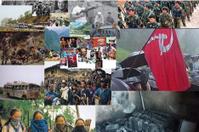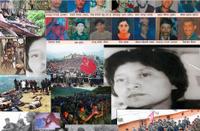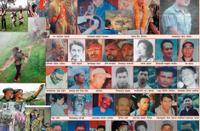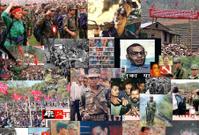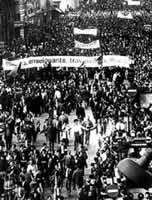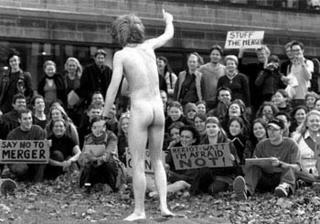
It happened after 2/1, and it has happened after the last concrete offer from the Maoists for comprehensive peace talks. The parties have decided they do want to talk to the Maoists after all.
- Logic For The Maoists
- Caste Discrimination Leads To War
- Possible Framework For A Maoist-Democrat Alliance
- Seize The Moment: Match The Maoists
- Finally The Democrats Make Sense
Ridiculed as the Mayor of Kathmandu after 2/1, the king has been out visiting. I think it is good he is.
Supreme Court, FM Radio Stations, And House Revival
The tussle between the government and the Supreme Court on the issue of if or not the FM radio stations may air news - duh! - has larger implications. If the Supreme Court were to revive the House, that would smooth so many things. The country could be spared a lot of pain.
Can't Make Private Banks Pay For Army Helicopter Purchases
That is a real bad move. It smacks of arm twisting of the worst kind. This also gives you hints the regime is only digging heels. It does not intend to negotiate.
In The News
- Seven-party alliance to hold talks with Maoists NepalNews The talks team will be formed after a committee of the civil society, which “will be constituted soon” assesses the environment for a dialogue with the rebel outfit, leaders said after a top-level meeting in Lalitpur this evening. Talks between the Maoists and the seven-party alliance, they said, will begin at an appropriate moment....... seven-party leaders were unanimous over the need for early talks with the rebels to resolve the ongoing conflict....... there has already been an understanding with the Maoist leadership for a dialogue but the Maoist ranks needed to create a talks-friendly atmosphere..... meeting also discussed the future course of the ongoing pro-democracy movement
- Scores injured in student protests against fuel price hike
- Pre-paid mobile service to resume from today
- HM leaves for Far and Mid Western Regions the visit is for ‘nearly a week.’ ...... It is King Gyanendra's second visit of its kind after the royal takeover of February 1. His Majesty had visited the Eastern Development Region earlier this month.
- CIAA files case against joint secy Shrestha ..... the Investigation of Abuse of Authority (CIAA) has arrested Narendra Man Shrestha, Joint Secretary at the Finance Ministry, on charges of abusing his authority and for amassing Rs 14.18 million when he was in different government positions..... Shrestha and his wife Rita Devi have been made defendants
- Three student leaders arrested
- WB provides $320m grant for rural roads, bridges
- Two RNA officers face action for Kavre incident ..... for sending armed troops in a passenger bus that was ambushed by the Maoists on June 10
- Nepal king tours rebel areas after landmine blast Reuters India, India
- Land mine blast kills 4 officers in Nepal Boston Globe, United States
- Nepal king tours rebel areas after landmine blast
Reuters AlertNet Guerrillas shut schools, colleges in central Nepal Xinhua, China - Nepal soldiers killed in ambush
BBC News Nine soldiers killed brutally in mid-western Nepal: NHRC People's Daily Online, China - Why the US Support for the King of Nepal is Important Global Politician, NY Dr. Khagendra Thapa More than 11,500 lives have been lost as a direct result of the conflict and another 23,000 have committed suicide because they could not bear the pain of loss of relatives and the property owing to the conflict...... According to Jana Dharana, a weekly newspaper published in Nepali language, in the course of last fifteen years, the elected criminal politicians, stole Rs.92,000,000,000 that is equivalent to US $1.5 billion...... The per capita income of Nepalese people has actually gone down after 1990 (was $265 and now it is $213) when democracy was introduced in Nepal...... The newspapers and other news media had become the mouth piece of the terrorists. The terrorists were also able to use the cell phones, internet, telephones, and FM radios as a means of communications........ the corrupt elected criminals who were indirectly supporting the terrorists. Please note that the one of the coalition partners of the dismissed government was communist party (Marxist, Leninist)..... The Nepalese King was put both his life and his throne at stake....... I understand that a group of Nepali Diaspora living in the USA and Western Europe are against the King of Nepal. They are indirectly lobbying for the insurgents....... huge peace rallies supporting the actions of His Majesty the King of Nepal have taken place in Washington DC, New York, Sidney, Australia, and even in New Delhi, India.......
- Maoists' Barbaric Acts Are Threat to Nepali People
Global Politician Nepal could turn into another Cambodia, Afghanistan, Bosnia or Rwanda. ..... If history is any guide, then the communist revolution has never come to the negotiating table. They simply buy time to reorganize their ragtag, hit-and-run fighters for the next wave of violence and destruction of public infrastructure.
Nepal - Beyond First Impression PeaceJournalism.com, Nepal - Cognitive Dissonance
Kathmandu Post Police break up Nepal student protests Aljazeera.net, Qatar - Nepal students clash with police over rising fuel prices; dozens ...
Peninsula On-line Nepal students and police clash Radio Australia Question Of Double Standards Gorkhapatra US treads gently as China's strength grows Financial Times, UK - NEPAL: Telecom employees resume protest against service suspension Asia Pacific Media Network, CA
- Nepalese rebels kill 4 police officers as king begins tour of ... Billings Gazette, USA
- Govt directs embassies to send progress report PeaceJournalism.com, Nepal His Majesty’s Government has directed all Royal Nepalese Embassies, consulates and even honourary consulates abroad to send monthly progress report including the visas issued by the diplomatic missions.
- The Real Truth About the People's War in Nepal Revolutionary Worker Online, IL
- Nepal Army to buy four choppers from Kazakhstan (LEAD) NewKerala.com, India In a bid to boost self-reliance, the Royal Nepalese Army plans to buy four MI-17 helicopters from Kazakhstan for Nepali Rs.2 billion ($17.43 million) besides training pilots at its own aviation academy.
- Bangladesh's political bombshell Asia Times Online, Hong Kong the events of August 17? On that day, nearly 500 explosions took place in 63 out of 64 districts, all within a 30-minute period.
- A new leaf Nepali Times, Nepal
- Nepal: New report shows foreign arms fuelling conflict and human ... Amnesty International UK, UK International arms sales to the Nepalese government are fuelling serious human rights abuses in Nepal, said Amnesty International today (15 June), as it released a new report calling for a complete suspension of all transfers of arms and related equipment
- Suicide rates are rising Nepali Times, Nepal
- Cease fire Nepali Times, Nepal
- Fuel price hike sparks fresh unrest in Nepal NewKerala.com, India
- Capitalism vs Communism: Lessons From History Global Politician, NY
- NT workers to stage indefinite strike Kathmandu Post, Nepal
- Govt buying 4 choppers with bank loans Kathmandu Post, Nepal Ministry of Defense (MoD) is all set to acquire the first-ever loan of Rs 1.1 billion from a consortium of commercial banks to finance the procurement of four Russian MI-17 helicopters for the Royal Nepalese Army (RNA).
- Nepali diaspora to rally for democracy Kathmandu Post, Nepal
- ‘Press freedom limited to newspapers’ Kathmandu Post, Nepal
- Pay attention Kathmandu Post, Nepal The United Nations Office of the High Commissioner for Human Rights (OHCHR Nepal) on August 19 unveiled its reports of investigation into attacks against public buses in Madi, Chitwan and Narke Bazar, Kavrepalanchok, which took place on June 6 and 10
- Pili captives are safe: INSEC Kantipur Online, Nepal
- New report documents the impact of the civil war on Dalits OhmyNews International, South Korea
- Govt Moves SC to Re-gag FM Radio Stations Himalayan Times, Nepal
- Adhikari for Party’s Focus on Joint Agitation Himalayan Times, Nepal
- Rs. 2.4 M looted from capital’s money transfer office Gorkhapatra, Nepal In what may be called a mystic style of looting, a group of four unidentified armed persons looted over Rs.2.4 million from Prabhu Money Transfer at Ghantaghar in Kathmandu early this afternoon.
- RNAC slashes air fares Gorkhapatra, Nepal
- Equal Rights – Miles Away Gorkhapatra, Nepal Since the 1950s, the terms ‘developed’, ‘underdeveloped’ and lately ‘developing’ have been used freely to assess the progress or otherwise of a country primarily outside the communist world.
- Maoist camps busted in Bihar PeaceJournalism.com, Nepal
- Surrender drives wedge in NLFT Calcutta Telegraph, India National Liberation Front of Tripura (NLFT) appears to be facing a crisis of existence with as many as 21 hardcore activists of the outfit laying down arms over the past three days.
- Chamling warns of identity crisis The Statesman, India “Indian Nepalese are facing a severe identity crisis in India as most of the time we are falsely involved in various cases with Nepal,” the Sikkim chief minister, Mr Pawan Kumar Chamling
- Government will punish the perpetrators of August 17 blast: PM Deepika, India
- Canadians ignore advice on Nepal visit PeaceJournalism.com, Nepal
- Govt Moves SC Against its Order on FM Stations Himalayan Times, Nepal
- NTC Staffers Launch Third Phase of Stir Himalayan Times, Nepal
- US chooses lesser of two evils Pioneer Press, MN
- RPP Chief stresses talks with parties, Maoists Gorkhapatra, Nepal
- Modernization threatens indigenous communities Gorkhapatra, Nepal
- 7-party meet to continue tomorrow Kantipur Online, Nepal
- Pakistan’s ruler acts to polish his image Financial Times, UK
- India Using Maoists Against Nepal PakTribune.com, Pakistan
- Bombers to be hunt down, punished: Bangladeshi minister Xinhua, China
- US bomb expert arrives in Dhaka People's Daily Online, China
- Media urge Bangladesh to admit Islamic militancy Reuters AlertNet, UK
- Over 350 bombs explode across Bangladesh Pakistan Dawn, Pakistan Over 350 small bombs went off at different places, including 63 in the country’s 65 district headquarters, between 10.30am and 11.30am..... the unprecedented serial blasts..... serial blasts took place within an hour of Prime Minister Khaleda Zia’s departure for Beijing on a five-day official visit to China and about two months ahead of the twice-postponed 13th summit of South Asian Association for Regional Cooperation, now scheduled for November 12 and 13...... In the capital, the bombs went off at different places, including the Zia International Airport, High Court, district judge’s court, National Press Club, Dhaka Electricity Supply Authority Headquarters, Mohakhali inter-district bus terminal, Gulshan Natun Bazar, near Dhaka Sheraton Hotel, and the Dhaka University campus..... police said that they received reports of bomb explosions at 28 places in the capital....... leaflets of the recently banned Jamaatul Mujahideen, an Islamist political outfit, were found at the scenes of blasts.....the leaflets that were found at almost all the sites of blasts warned the government of counter-action “if any Muslim is arrested for campaigning for the enforcement of Islamic laws in Bangladesh”.









